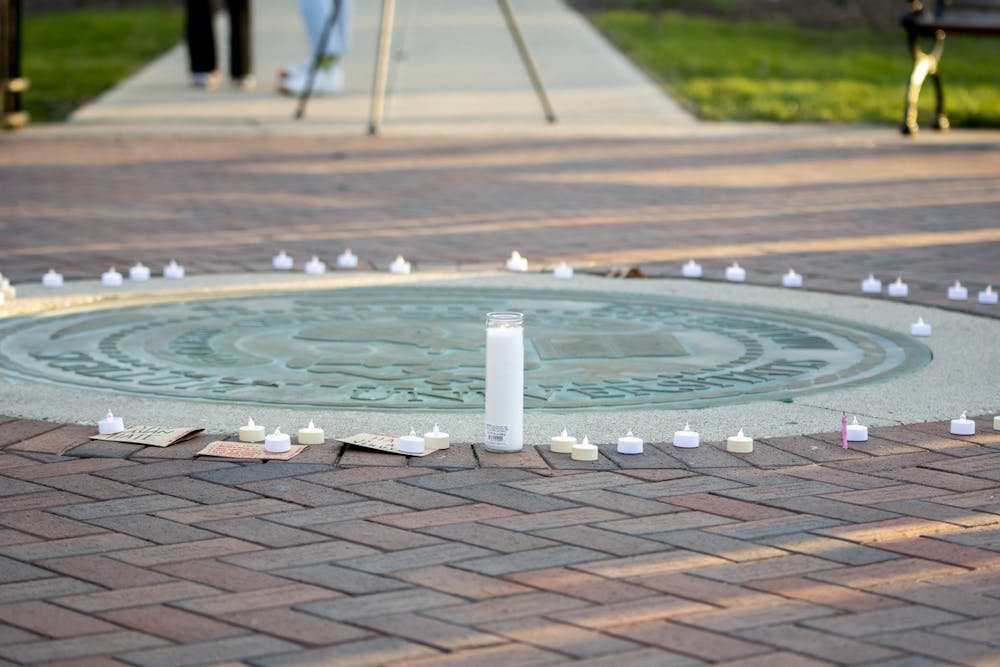It’s been about a year since videos of elders being attacked and the tragic shootings in Atlanta and Indianapolis put a spotlight on hate crimes and racism toward the Asian-American and Pacific Islander (AAPI) community.
It’s also been about a year since the creation of the Stop AAPI Hate movement, a social phenomenon that puts emphasis on the racism and exclusion faced by members of the AAPI community in the U.S.
It’s been about a year, and anti-Asian racism hasn’t gone away.
A sophomore psychology major at Miami University who preferred to remain anonymous said her first day in the U.S. after coming from Vietnam to start in-person learning at Miami was stained with an ugly mark when she was yelled at by someone in a car when walking with friends.
“There was a car that drove past us, and I heard a noise,” she said. “Someone leaned towards the window and said something; I thought they said ‘hi’ and I was smiling, asking my friends what they were saying –they were like, ‘Yeah, we got barked at.’”
She said the incident made her experience – as someone from Vietnam living in America for the first time – isolating and uncomfortable.
“I was just intimidated,” she said. “It was, like, the first day on campus, and I already was feeling like, ‘I wanna go home, I’m not gonna survive here.’”
Incidents like these don’t only affect students, either.
Mary Yang is a sophomore majoring in biology at Miami who commutes to school from Fairfield. She said she witnessed a disgruntled white customer yell at the Chinese employees of a Japanese grill restaurant she works at.
“[The customer was causing a scene], so the owner had to start asking the lady to leave the property; the manager had to translate what the owner was saying, so they were talking in Chinese,” Yang said. “The lady got offended that they were talking in another language and said ‘I went to college: I know what you’re saying. If you have shit to talk about me, talk about me directly.’”
Yang said the customer was previously talking and arguing with other customers about Black rights. Yang said this aggressive mindset regarding racism was problematic.
“That was a whole interesting mix of social problems, and it really makes you think about in what scenario would you consider racism; the more we focus on racism the more we emphasize it, and rather than becoming an inclusive community we become wary of other people’s differences,” Yang said. “Combating racism is about being open, accepting your mistakes, accepting your bias, rather than attacking other people for their ignorance.”
Enjoy what you're reading?
Signup for our newsletter
Despite these incidents in Oxford, the topic is less prevalent in national media than it was last spring.
Katherine Cho, an assistant professor in the department of educational leadership at Miami, said the seemingly lower media interest could be due to an overwhelming amount of trauma and other issues affecting Americans today.
“The underlying issue is still very much present, [but] the capacity to which people can address it has shifted to a degree,” Cho said. “Ultimately people are tired. I think about the sheer number of catastrophes in an ongoing pandemic and there’s a lot of noise surrounding it, and what does it mean for [the Stop Asian Hate Movement] to try to survive in a cacophony of sound?”
Cho said this didn’t mean the movement was a failure, though. In fact, she said it greatly helped with how the media deals with AAPI racism.
“I do think that there is more of a willingness to talk about the historical significance and tensions that exist,” Cho said. “[It seems that] media sites and sources are trying to better explain that the hate didn’t come out of nowhere.”
Looking forward, Cho said she hopes to see a focus on education and unity.
The anonymous student said she appreciated the anti-racism workshops and resources the university offers relating to AAPI racism, but she thinks it doesn’t do enough to solve the issue at large.
“The people who go to those anti-racism workshops already know about the issue, and they want to help,” she said. “People who really need that aren’t ever going to go to those. We need to actually reach the audience that we cannot reach and make it mandatory to learn about [anti-racism] in our classes.”
Cho agreed that mandatory education could be beneficial to faculty in addition to students.
“If you are making things not a requirement, faculty don’t really attend, and I think it’s important to figure out how to get faculty to care,” Cho said. “Course evaluations don’t have a metric of diversity or addressing diversity. We need better systems for students.”
In addition to reforming institutions at Miami, students are also pushing to make the AAPI community feel welcome and united on campus.
Justin Tirtadjaja is a senior engineering major and the current president of the Asian-American Association (AAA) at Miami. He said he has used his position to spread awareness about Asian culture in a positive way on campus.
“Because [AAA] is explicitly not an advocacy group, the best that we can do is to show Miami University what Asian culture is and who Asian Americans are through events like the Asian Culture Festival or fusion,” Tirtadjaja said. “A lot of the time hatred comes from ignorance and not understanding, so we are trying to change that.”
Regardless of what the future holds, though, Miami students today are still facing AAPI hate today.
“Imagine just being here, an international [student], all by yourself with no family, no home, whatever,” the unnamed student said. “I just feel unwelcome and so alone here and it just makes everything so much worse.”
The Office of Institutional Diversity and Inclusion has resources for anyone who wants to learn more about the AAPI community and seek support in race-related issues:




